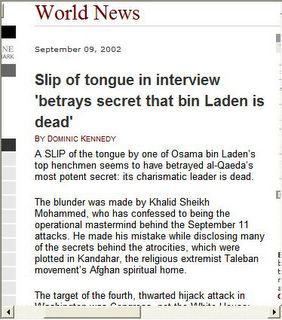
Slip of tongue in interview 'betrays secret that bin Laden is dead' By Dominic Kennedy
A SLIP of the tongue by one of Osama bin Laden’s top henchmen seems to have betrayed al-Qaeda’s most potent secret: its charismatic leader is dead. The blunder was made by Khalid Sheikh Mohammed, who has confessed to being the operational mastermind behind the September 11 attacks. He made his mistake while disclosing many of the secrets behind the atrocities, which were plotted in Kandahar, the religious extremist Taleban movement’s Afghan spiritual home. The target of the fourth, thwarted hijack attack in Washington was Congress, not the White House; the original plan was to crash aircraft into atomic power stations; and the plotters used simple codes to keep in touch by internet, he disclosed. Mr Mohammed was speaking in a propaganda exercise organised by al-Qaeda in time for the first anniversary of September 11. A television journalist from al-Jazeera, the Arabic satellite television station that has previously broadcast exclusive footage of bin Laden, was blindfolded and taken to meet two al-Qaeda chiefs. During two days of interviews, Mr Mohammed referred to bin Laden, who has not been seen since the fall of Afghanistan’s Taleban regime, in the past tense. The reporter Yosri Fouda, London bureau chief for al-Jazeera, concluded that bin Laden is now likely to be dead. The journalist was taken to the Pakistan city of Karachi, driven five miles into the countryside, blindfolded, then brought to a clandestine rendezvous on the fourth floor of a sparsely furnished flat. He believes that it was in Karachi. There he met Mr Mohammed and Ramzi bin al-Shibh, a former flatmate of Mohamed Atta, the hijack ringleader. Mr bin al-Shibh is a suspect in the bombing of the USS Cole, when 17 sailors were killed in the port city of Aden in Yemen in October 2000. He described himself as head of al-Qaeda’s military committee. The two men spoke of September 11 as “Holy Tuesday”. They described the attacks using the Arabic word ghazwah, which means a raid against enemies of the Prophet, Mr Fouda wrote in The Sunday Times. It had taken 2½ years to plan the attacks, the men disclosed. Al-Qaeda’s military committee had decided there must be a “martyrdom operation” inside America. Nuclear targets were the first choice, but they were ruled out for now, Mr Mohammed said. The hijackers were recruited from al-Qaeda’s “Department of Martyrs”, which still has scores of volunteers for future suicide attacks, the men claimed. Atta, an al-Qaeda sleeper agent studying town planning in Hamburg since 1992, was chosen as a pilot and Nawaf al-Hazemi as his second-in-command. Mr bin al-Shibh wanted to be the twentieth hijacker. He applied for a visa for flight training three times, but was turned down on security grounds. Questions are likely to be asked over whether alarm bells should have sounded in the United States over such a suspicious individual being so keen to go to America to learn to fly. The leading hijackers were summoned to Kandahar for a shura or council meeting. Four advance reconnaissance units were sent to America. The chosen pilots enrolled in US flight schools. Meanwhile, young Saudi volunteers were picked to act as “muscle” in the hijacking of the aircraft. “They knew it was a martyrdom operation, but did not know the details,” Mr Mohammed said. As investigators have long suspected, the plotters did use the internet to communicate, the men confirmed. Using a chatroom, Atta sent messages in German from America, posing as a student, to “Jenny”, his fictitious girlfriend. The real recipient was Mr bin al-Shibh. In al-Qaeda’s code the World Trade Centre was “the faculty of town planning” (Atta hated skyscrapers, preferring traditional Islamic architecture), the Pentagon was “the faculty of fine arts” and Congress was the “faculty of law”. In a final telephone call Atta told Mr bin al-Shibh the chosen date for the attacks. “Two sticks, a dash and a cake with a stick down”, he said, meaning 11/9. The news reached bin Laden on September 6, giving him only five days’ warning of the horrors. Mr Mohammed’s slip of the tongue about bin Laden’s demise was a serious lapse. Throughout their discussions with the reporter, al-Qaeda operatives persistently sought to suggest that their leader was still alive, well and keenly following events. One intermediary told the journalist that bin Laden remained an avid viewer of al-Jazeera, so much so that “whatever he misses, he gets on tape”. Al-Qaeda’s decision to bring a reporter from al-Jazeera to meet two of bin Laden’s generals rather than the man himself adds to the impression that their leader may be no more. The satellite channel has previously been trusted with interviewing bin Laden in person, in 1997 and 1998. Mr Fouda was also suspicious when al-Qaeda failed to send him videotapes of the interviews, as promised, although audiotapes did arrive. “I am driven to the interpretation that something is wrong with the upper reaches of al-Qaeda — some sort of disruption. I now believe it is more than likely bin Laden is dead,” he said.
No comments:
Post a Comment